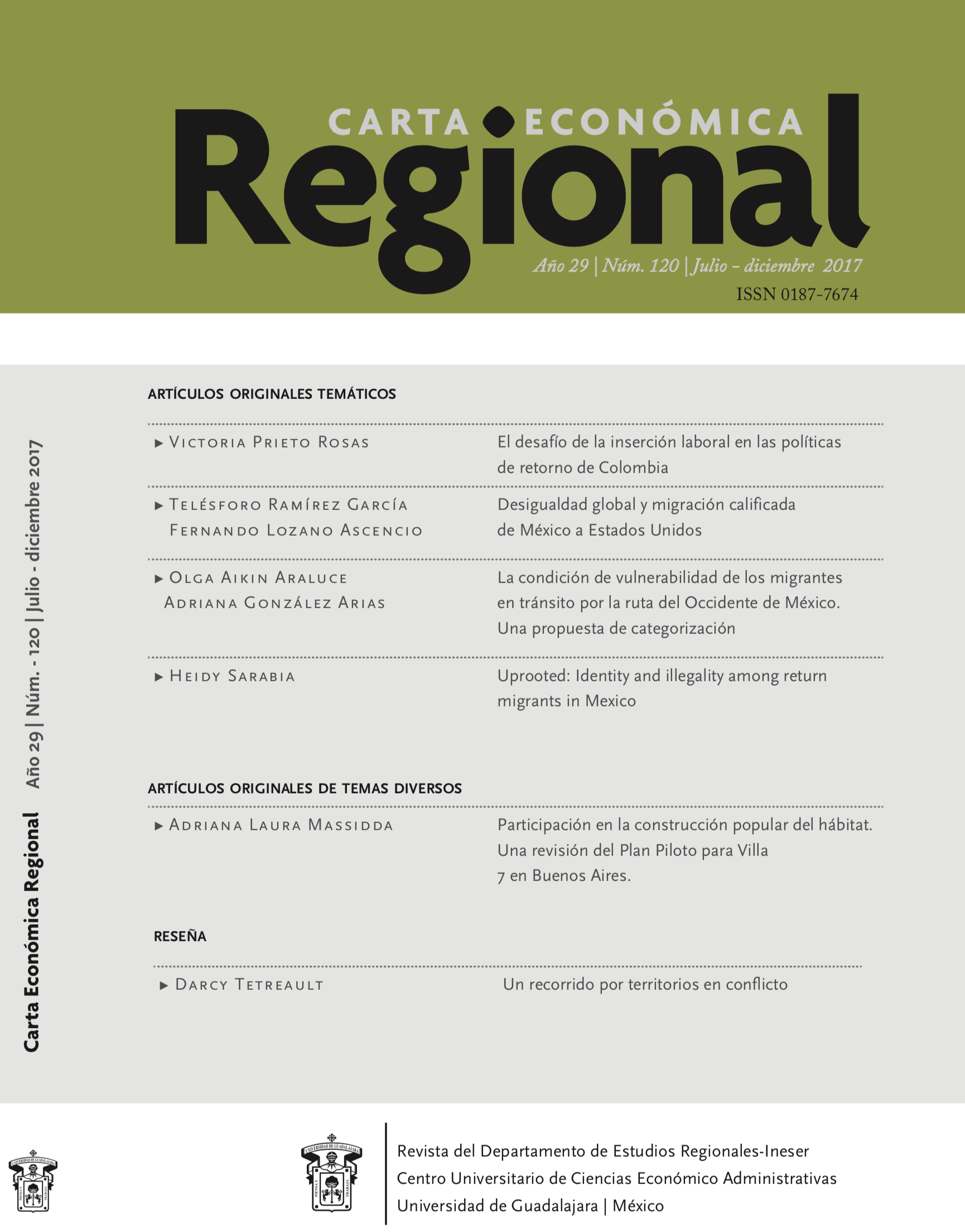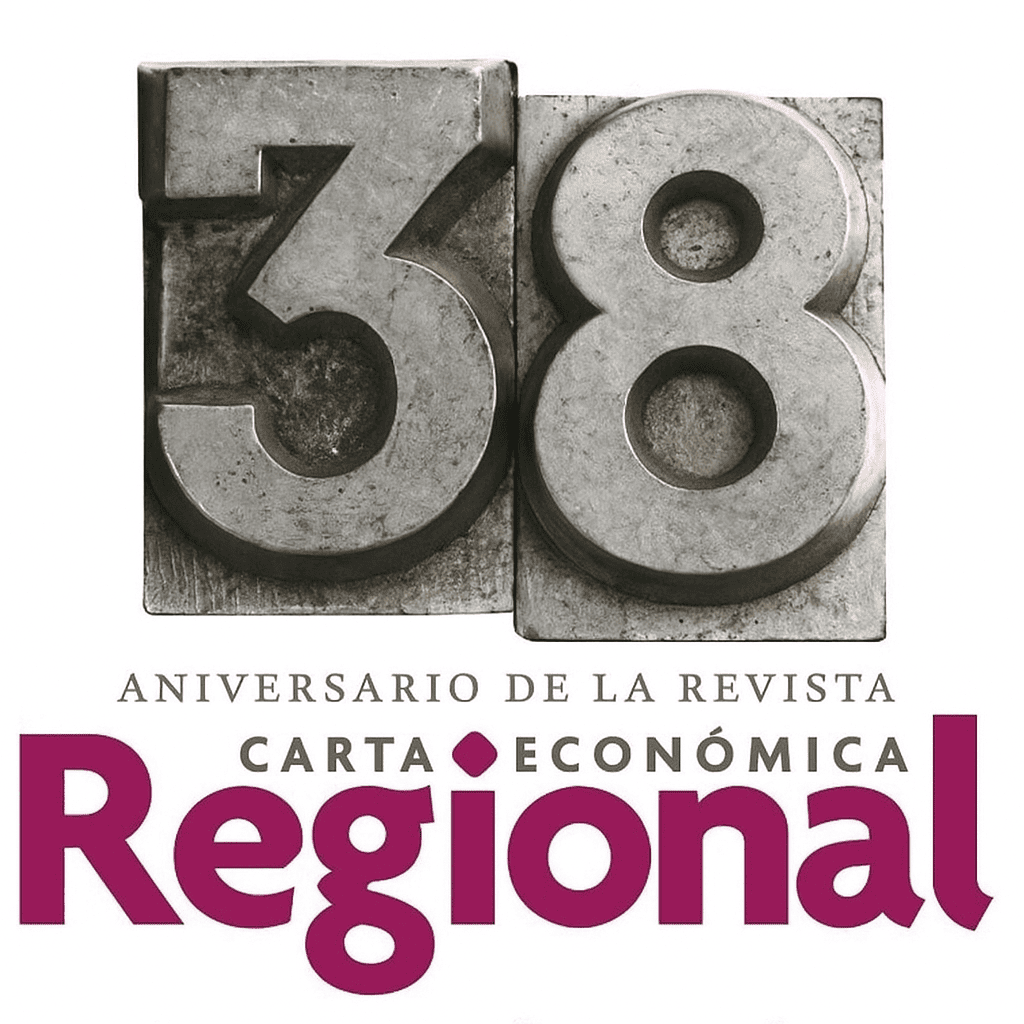Uprooted: Identity and illegality among return migrants in Mexico
Resumen
Este artículo analiza las experiencias de migrantes mexicanos que llega- ron como niños a los Estados Unidos, pero regresaron a México como adultos jóvenes, y muestra cómo las identidades estatales y nacionales son moldeadas por los contextos culturales y legales de recepción tanto en los Estados Unidos como en México. En los Estados Unidos, su identidad nacional como “americanos” se logra a través del proceso de socializa- ción, pero su relación con el estado es determinada por su estatus legal. Mientras que, en México, su relación con el estado es informada por su condición de ciudadanos, pero su identidad nacional es complicada por su falta de conocimiento de la cultura mexicana. Las identidades nacio- nales y estatales fragmentadas, tanto en Estados Unidos como en México, configuran las experiencias de reincorporación de estos migrantes como “mexicanos americanizados” en México. Este artículo se basa en entrevistas y observaciones recogidas en Mexicali, Baja California, México, entre julio de 2009 y agosto de 2010.Citas
Abrego, L. J. (2011). Legal consciousness of undocumented Latinos: fear and stigma as barriers to claims-caking for first —and 1.5— generation immigrants. Law and Society Review, 45(2), 337-370.
Anderson, J. (2015). ‘Tagged as a criminal’: narratives of deportation and return migration in a Mexico City call center. Latino Studies, 13(1), 8-27. Recuperado de http://www.palgrave-journals.com/doifinder/10.1057/lst.2014.72
Andreas, P. & Biersteker, T. J. (2003). Te rebordering of North America: integration and exclusion in a new security context. New York and London: Routledge.
Appadurai, A. (1996). Modernity at large: cultural dimensions of globalization. Minneapolis: University of Minnesota Press.
Bosniak, L. (2000). Citizenship denationalized. Indiana Journal of Global Legal Studies, 7(2), 447-509.
Brown, W. (2010). Walled states, waning sovereignty. New York: Zone Books.
Brubaker, R. (1992). Citizenship and nationhood in France and Germany. Cambridge, Mass.: Harvard University Press.
Burke, P. & Stets, J. E. (2000). Identity theory and social identity teory. Social Psychology Quarterly, 63(3), 224-237. Retrieved from http://www.jstor.org/stable/2695870 [Accessed: March 14, 2016].
Cassarino, J. P. (2004). Teorising return migration: the conceptual approach to return migrants revisited. International Journal on Multicultural Societies, 6(2), 253-279.Retrieved from http://www.researchgate.net/publication/26593895_Te_Management_of_Multicultura- lism_Coming_to_Terms_with_the_Multiplication_of_Experienced_Difference/file/72e7- e52c6d7eab2a28.pdf#page=60) [Accessed: December 10, 2016].
Cobo, S. D., Giorguli, S. E. & Alba, F. (2010). Occupational mobility among returned migrants in Latin America: a comparative analysis. Te Annals of the American Academy of Political and Social Science, 630(1), 245-268. Retrieved from (http://ann.sagepub.com/cgi/doi/10.1177/0002716210368286) [Accessed: January 23, 2015].
Coutin, S. B. (2000). Legalizing moves: Salvadoran immigrants’ struggle for U.S. residency. Ann Arbor: University of Michigan Press.
DeGenova, N. (2004). Te legal production of Mexican/migrant ‘illegality.’ Latino Studies, 2, 160-185.
DeGenova, N. P. (2002). Migrant ‘illegality’ and deportability in everyday life. Annual Review of Anthropology, 31, 419-447.
Eschback, K., Hagan, J., Rodriguez, N., Hernandez-Leon, R & Balley, S. (1999). Death at the border. IMR, 33(2), 430-454.
Gitter, S. R., Gitter, R. J. & Southgate, D. (2008). Te impact of return migration to Mexico. Estudios Económicos, 23(1), 3-23.
Glick-Schiller, N., Basch, L. & Szanton-Blanc, C. (1994). From immigrants to transmigrants: theorizing transnational migration. Anthropological Quarterly, 68(1), 48-63.
Gonzalez, R. G. & Chavez, L. R. (2012). ‘Awakening to a nightmare’: objectivity and illegality in the lives of undocumented 1.5 generation Latino immigrants in the United States. Current Anthropology, 53(3), 255-281.
Gonzalez, R. G. (2011). Learning to be illegal: undocumented youth and shifing legal context in transition to adulthood. American Sociological Review, 76(4), 602-619.
Held, D. (1999). Democracy, the nation-state and the global system. In Waters, M. (ed.), Modernity critical concepts (vol. 4, Afer modernity). London: Ruotledge. Levitt, P. (2001). Te transnational villagers. Berkeley: University of California Press.
Marshall, T. H. (1964). Class, citizenship and social development. Chicago: University of Chicago Press.
Moya, E. M., Chávez Baray, S., Esparza del Villar, O. & Castañeda, E. (2016). El síndrome de Ulises en inmigrantes económicos y políticos en México y Estados Unidos. Ehquidad International Journal of Welfare and Social Work Policies, 5, 11-50.
Nazario, S. (2007). Enrique’s journey: the story of a boy’s dangerous odyssey to reunite with his mother. New York: Random House LLC.
Ngai, M. M. (2005). Impossible subjects: illegal aliens and the making of modern America. Princeton: Princeton University Press.
Ohmae, K. (1994). Te borderless world: power and strategy in the global marketplace. London: Harper Collins.
Ong, A. (1996). Cultural citizenship as subject-making: immigrants negotiate racial and cultural boundaries in the United States. Current Anthropology, 37(5), 737-751.
Rosaldo, R. (1994). Cultural citizenship and educational democracy. Cultural Anthropology, 9(3), 402-411.
Rosas, G. (2006). Te managed violences of the borderlands: treacherous geographies, policeability, and the politics of race. Latino Studies, 4, 401-418.
Rumbaut, R. (2004). Ages, life stages, and generational cohorts: decomposing the immigrant first and second generations in the United States. IMR, 38(3), 1160-1205.
Sarabia, H. (2012). Perpetual illegality: results of border enforcement and policies for Mexican undocumented migrants in the United States. Analyses of Social Issues and Public Policy, 12(1), 49-67.
Sarabia, H. (2014). Global South cosmopolitans: the opening and closing of the usa–Mexico border for Mexican tourists. Ethnic and Racial Studies, 38(2), 227-242.
Sassen, S. (2003). Global cities and survival circuits. In Ehrenreich, B. & Hochschild, A. R. (eds.), Global woman: nannies, maids, and sex workers in the new economy. New York: Metropolitan Books.
Suárez, M. J. (2016). De ida y de vuelta: el impacto de la política migratoria estadounidense en México y su población retornada. Carta Económica Regional, 114, 66-91.
Truax, E. (2015). Dreamers:an immigrant generation’s fght for their American dream. Boston, Mass.: Beacon Press.
Ullmann, S. H., Goldman, N. & Massey, D. S. (2011). Healthier before they migrate, less healthy when they return? Te health of returned migrants in Mexico. Social Science & Medicine, 73(3), 421-428.
Waldinger, R. (2008). Between ‘here’ and ‘there’: immigrant cross-border activities and loyalties. Te International Migration Review, 42, 3-29.
Yuval-Davis, N. (1997). Women, citizenship and difference. Feminist Review, 57, 4-27.
Aquellos autores/as que tengan publicaciones con esta revista, aceptan los términos siguientes:
- Los autores/as conservarán sus derechos de autor y garantizarán a la revista el derecho de primera publicación de su obra, el cuál estará simultáneamente sujeto a la Licencia de reconocimiento de Creative Commons que permite a terceros compartir la obra siempre que se indique su autor y su primera publicación esta revista.
- Los autores/as podrán adoptar otros acuerdos de licencia no exclusiva de distribución de la versión de la obra publicada (p. ej.: depositarla en un archivo telemático institucional o publicarla en un volumen monográfico) siempre que se indique la publicación inicial en esta revista.
- Se permite y recomienda a los autores/as difundir su obra a través de Internet (p. ej.: en archivos telemáticos institucionales o en su página web) déspues de que su trabajo sea publicado, lo cual puede producir intercambios interesantes y aumentar las citas de la obra publicada. (Véase El efecto del acceso abierto).











